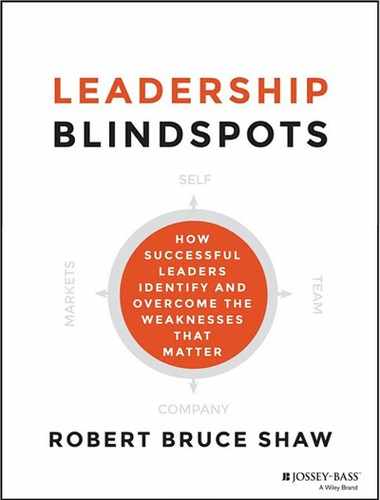RESOURCE D
READINGS ON LEADERSHIP BLINDSPOTS
Learning from Others’ Successes
- Michael A. Roberto has written a number of excellent books on leadership; his Know What You Don't Know: How Great Leaders Prevent Problems Before They Happen (Pearson Prentice Hall, 2009) is the most relevant in regard to blindspots.
- Robert I. Sutton, in Good Boss, Bad Boss: How to Be the Best … and Learn from the Worst (Business Plus, 2012), has insightful things to say about leadership in general. This book is a good place to start if you are new to Sutton's work. I also suggest reading his blogs on the HBR Blog Network (blogs.hbr.org/sutton).
- Marshall Goldsmith is well known for his insights on how successful executives avoid the problems that plague others, particularly in regard to their behavior; see his book What Got You Here Won't Get You There: How Successful People Become Even More Successful (Hyperion, 2007).
Learning from Others’ Failures
- Richard S. Tedlow, in Denial: Why Business Leaders Fail to Look Facts in the Face—and What to Do About It (Portfolio, 2010), presents rich case histories of corporate denial.
- Sydney Finkelstein, in Why Smart Executives Fail (Portfolio, 2003), provides an interesting assessment of failure with many case studies.
- Max Bazerman and Ann E. Tenbrunsel, in Blind Spots: Why We Fail to Do What's Right and What to Do About It (Princeton University Press, 2012), view blindspots from an ethical vantage point, with useful models and recommendations.
- Kathryn Schulz, in Being Wrong: Adventures in the Margin of Error (HarperCollins, 2010), looks at the reasons why we make mistakes. Her work combines research with an interesting philosophical view of the errors we make.
- Daniel Kahneman, author of Thinking, Fast and Slow (Farrar, Straus and Giroux, 2013) and a highly respected scholar, examines how people process information and the mistakes they make in doing so.
- Daniel Goleman was one of the first to write for a general audience on what research can tell us about self-deception; see, in particular, his book Vital Lies, Simple Truths: The Psychology of Self-Deception (Simon & Schuster, 1996).
- Malcolm Gladwell discusses the logic and limits of leadership hubris in “Cocksure: Banks, Battles, and the Psychology of Overconfidence,” The New Yorker, July 27, 2009.
- Robert Trivers, in The Folly of Fools: The Logic of Deceit and Self-Deception in Human Life (Basic Books, 2011), offers a fascinating mix of sociobiology and personal history. Trivers is one of the most original thinkers on self-deception.
..................Content has been hidden....................
You can't read the all page of ebook, please click here login for view all page.
